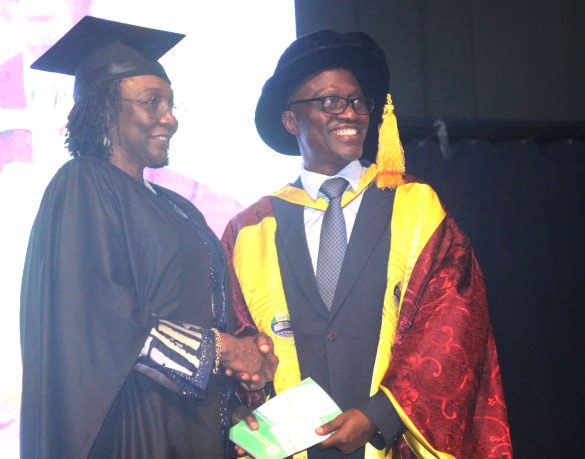In order to safeguard the future of media and journalism in Nigeria, stakeholders in the media industry must adopt innovative funding mechanisms, interdisciplinarity in education, and advocate for ethical practices that prioritise the public good over private interests.
Professor Ismail Adegboyega Ibraheem, who stated this while delivering the 5th Inaugural Lecture in the 2024/2025 Academic session on ‘Casino Journalism and the End of History’ last Wednesday at the University of Lagos, stated; “This approach promises a resilient media system capable of navigating societal challenges while upholding democratic ideals, ultimately paving the way for a brighter future for the industry in Nigeria“.
The Professor of journalism and media studies also said the media industry needed a media ombudsman who will protect the government, the public and voiceless individuals against irresponsible and casino-like media performance.
He described as a worthy initiative the recent composition of the National Media Complaints Commission (NMCC), otherwise known as the National Ombudsman by the Nigeria Press Organisation (NPO) which comprises the Nigerian Guild of Editors (NGE), the Newspaper Proprietors’ Associationof Nigeria (NPAN), the Nigeria Union of Journalists (NUJ), the Broadcasting Organisation of Nigeria (BON), the Guild of Corporate Online Publishers (GOCOP) and Civil Society Organisations.
Professor Ibraheem pointed out that the Ombudsman’s recent intervention involving the Daily Trust and the Federal Government of Nigeria over the SAMOA agreement report was a classic example of independent, fair, and balanced efforts that must be sustained and should be allowed to trickle down to individual newsrooms.
He, however, stated that some of the media’s unprofessional practices were rooted in the absence of a sustainable funding model to protect independent media in Nigeria, stating that a collaborative effort with the Federal Ministry of Digital Economy is needed to advocate for a more equitable distribution of advertising revenue from major tech giants such as Google and Meta to support independent media organisations.
“This idea is already gaining traction globally. Financial stability is key to media sustainability. However, in the face of dwindling advertising fortune and the accompanying “advert politics” that often lead to censorship, it is important for the media to consider robust and sustainable revenue generation streams that could support media independence and enhance the watchdog roles“, Ibraheem further stated.
He said though establishing Foundations by media houses to attract funding support from philanthropic organisations, as exemplified by some entities was a good initiative, “this should also be moderated to avoid the imperialists taking over our newsroom disguising as funders“.
On the topic of the inaugural lecture, the Professor said; “The convergence of casino journalism and the “End of History” thesis has profound implications for how the public understands history and current events. On the one hand, casino journalism contributes to a shallow understanding of history by focusing on sensational stories that capture attention but fail to provide context or depth.
“This is especially dangerous in a country like Nigeria, where historical events, such as the Biafran War or the military dictatorship era, continue to shape national identity and political dynamics. Without proper contextualisation, the media risks distorting the public’s understanding of these historical moments, reducing them to sensational headlines instead of complex events that require thoughtful examination. On the other hand, the “End of History” mindset in Nigerian media discourages critical reflection on the past and its lessons from the present. This results in a superficialunderstanding of current events.
“The intersection of casino journalism and the “End of History” in Nigeria has created a media landscape that undermines informed public discourse and critical engagement with the nation’s history and current events. Emphasis on sensationalism and entertainment undermines serious political, social, and economic discussions, while the “End of History” mindset encourages complacency in the face of systemic challenges.
“These two phenomena profoundly affect how Nigerians understand their history and navigate their present challenges. To move forward, there is a need for a media transformation that prioritises factual reporting, context, and critical analysis, as well as a more nuanced approach to reporting issues in the country. To democratic governance that acknowledges the country’s complexities and historical realities. Only through this can Nigeria move towards a more informed and empowered citizenry capable of engaging with the real issues that affect its future”, Professor Ibraheem further said.
According to him, the implication of the twinning of casino journalism and the end of history, is very severe as ethical standards are compromised by some of the owners and professionals working for media platforms.
In her closing address, the Vice-chancellor of the University, Professor Folasade Ogunsola, OON, FAS,
Professor Ibraheem for the lecture which painted a vivid picture of a media landscape teetering between ethical responsibility and sensationalism, adding that the lecturer ‘brilliantly articulated how casino journalism-with its penchant for the dramatic and the superficial erodes critical public discourse, endangers historical contextualization, and undermines our collective understanding of societal challenges’.
“Professor Ibraheem’s exploration into the “End of History”mind-set also exposed a perilous tendency towards complacency in the face of systemic issues, particularly in a nation as richly complex as Nigeria. His critique reminds us that the media, when stripped of depth and context, risks serving the interests of the powerful rather than the public good. His call for a transformation in the media system no doubt is a clarion call for ethical reporting, factual analysis, and historical accuracy, values that are foundational to a resilient democratic society”, the UNILAG VC stated.
She then urged people to heed Professor Ibraheem’s call to protect and promote a free, responsible, and resilient media system, adding that; ‘For in doing so, we safeguard the future of our democratic ideals’.
for a better society


